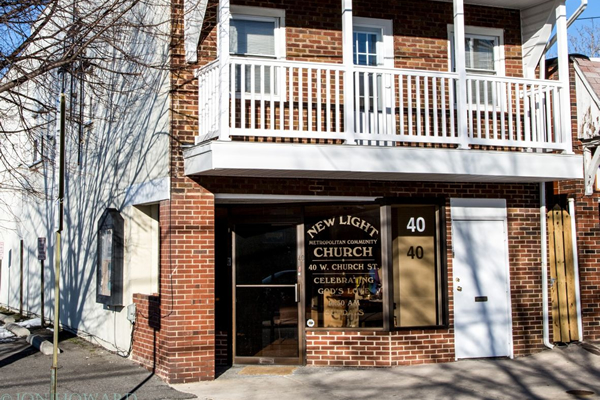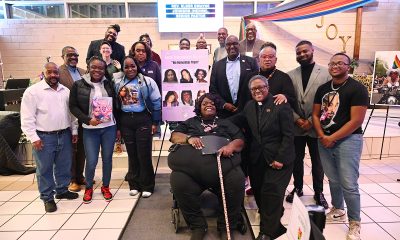Living
SPIRITUALITY 2018: Inner city, small town MCC church experiences vastly different
Clergy members say affirming denomination still needed in 2018 and beyond

Exterior of the Metropolitan Community Church of Washington. (Photo by Elvert Barnes; courtesy Wikimedia Commons)
It’s a much different thing to go to a Metropolitan Community Church in a major city vs. a small town and the denomination itself, founded in the late ‘60s as a Protestant fellowship for LGBT Christians, is in a time of transition as more churches, especially in Christianity’s more liberal branches, have become affirming. Roman Catholics and evangelicals — the two largest groups of U.S. believers — are the biggest holdouts.
As Christianity’s Paschal Triduum culminates with Easter this weekend, we checked in with two regional LGBT MCC clergy to find out how their parishes are doing in 2018. Rev. Deb Coggin is pastor of New Light MCC in Hagerstown, Md. Rev. Cathy Alexander is associate pastor of MCC Washington. They responded via e-mail.

New Light MCC
New Light MCC — Hagerstown, Md.
What year was your church started? 1996
Was it always an MCC church? yes
How many weekend services do you have on a normal week? one
About how many folks walk through your doors on an average Sunday? 20-25
Are you full-time, part-time or volunteer? Part-time – 20 hours a week
What is your annual operating budget? $53,000
How do you feel the needs may be different of MCC believers/members in major cities vs. small towns or suburbs? In a small city, support and safe places for LGBT are fewer. The needs remain the same. All of us need support, a safe place to be and the affirmation that God is with us. This message is part of the DNA of MCC.
Are you doing a Good Friday or Holy Saturday service? Good Friday service is tonight at 7 p.m.
What times are your Easter services? 10:30 a.m.
How is your Easter Sunday morning worship different? We add a few extra readings and special pieces however; the base of the service remains the same.
What was your attendance for Easter 2017? 32
As the mainline churches have become more welcoming, what does MCC offer that they do not in your opinion? MCC is more than welcoming. We celebrate all of who we are as children of God. We are more than affirming. We are inclusive. Everyone is invited to full participation in the life of an MCC community of faith.
Are there many cradle Catholics and/or cradle evangelicals in your pews? As those bodies have dug in their heels against LGBT folks, how does MCC have relevance to those believers? Our congregation has many of both. It is the same for all who have been preached at as if they are evil. We help them heal and discover for themselves what God has to say. We plan services and activities so all feel accepted and comfortable. We honor some traditions of all Christian faiths while creating something new for all.
Are mainline churches in Hagerstown very affirming? In Hagerstown, we have several very affirming churches, however, most churches either tolerate or are outwardly hostile to LGBT people. We offer a safe place for healing from church abuse in all forms. We encourage the full participation in the life of our community. We seek to teach people to live in the questions of faith as opposed to declaring we have all the answers. We offer a positive biblical message about LGBT people as well as refute and explain passages which have been used to abuse LGBT people.
What kind of faith community were you raised in if any? I was 28 before I came into a faith belief with God. I quickly moved from Southern Baptist to Assemblies of God to Pentecostal to MCC.
What’s a general scripture passage that continues to resonate with you? Romans Chapter 8 resonates with me and particularly verses 37-39: “No, in all these things we are more than conquerors through him who loved us. For I am convinced that neither death, nor life, nor angels, nor rulers, nor things present, nor things to come, nor powers, nor height, nor depth, nor anything else in all creation, will be able to separate us from the love of God in Christ Jesus our Lord.”
What’s your favorite hymn or sacred musical selection? Old hymn would be “What A Friend We Have In Jesus.” Contemporary praise would be “We All Bleed The Same.”
Overall how is the MCC needle shifting? Where do you see the fellowship going in the next 10-20 years? We are being called into accountability for being as fully inclusive as we promote. I believe we will continue to be in the forefront of the fight for justice — LGBT rights, homelessness, poverty, drug addiction, human trafficking, gun control, women’s rights, etc. Wherever there is injustice in the world, MCC along with others will be in the fight for justice.
Could you imagine a day where LGBT believers will be so fully integrated that there will be no need for MCC or is that too “pie in the sky” for our lifetime? Our founder, Rev. Elder Troy Perry once believed this was possible. For MCC now, it is not only the LGBT people involved in the life of MCC but heterosexuals as well as children. My wife and I adopted five girls. They are growing up in an MCC church and my hope is they will continue into adulthood with MCC, which is about more than sexuality. We believe in Gods call to help others. I believe there will always be people in need and the need for MCC to be present and active.
Metropolitan Community Church of Washington
What year was your church started? 1971
Was it always an MCC church? Yes, it has always been under the Metropolitan Community Churches (MCC) umbrella.
How many weekend services do you have on a normal week? We have two services per Sunday in the sanctuary. We also have a monthly interactive service on the last Sunday of each month led by our Young Adult Ministry. These services are held at various locations throughout the city. The last Sunday reflective service was held at the National Portrait Gallery. We are also re-starting our monthly Spanish speaking prayer service.
About how many folks walk through your doors on an average Sunday? We worship about 130-150 each Sunday on site and an additional 50-60 via live streaming of our services. Also an additional 40-60 views of the videos of the service. The message of love and acceptance is getting out there. MCC-D.C. is blessed to be one of the most diverse congregations in MCC on a variety of levels.
Do you have your own building? Yes
Are you full-time, part-time or volunteer? I am full time and the Senior Pastor Rev. Elder Dwayne Johnson is full time.
What is your annual operating budget? (declines to answer)
How do you feel the needs may be different of MCC believers/members in major cities vs. small towns or suburbs? The need for shelter, food, spiritual guidance, safe streets and community are consistent and driving forces for our neighbors no matter the geography. Where people congregate in a given location may differ, the ability to get around from place to place quickly may be different, and proximity to church may be a challenge. Many times in a suburban environment, the closest MCC may be hours away. This proves to be a challenge to establishing community. In an urban environment, the unpredictability of traffic is an issue in on-site attendance. It encourages us to seek different ways to reach out to and spiritually touch people (like livestream, remote campuses and other ways to make it easier for people to connect).
Are you doing a Good Friday or Holy Saturday service? One is planned for Good Friday, yes. We also held a Maundy Thursday service.
What times are your Easter services? 9 and 11 a.m.
How is your Easter Sunday morning worship different? We usually welcome more people to our services on Easter (Christmas Eve too). We have several ministries in our worship arts ministry (9 a.m. choir, 11 a.m. choir, First Sunday Choir, Moving Spirit Dance Ministry, Eclectic Praise Band, Drama Ministry, sound board, audio/visual) who minister on different Sundays throughout any given month. Most of our ministries will offer their gifts together during our Easter Sunday Services.
What was your attendance for Easter 2017? About 300 throughout Holy Week last year.
As the mainline churches have become more welcoming, what does MCC offer that they do not in your opinion? I don’t think it is so much a matter of what one offers against the other. I believe there is enough hurt and spiritual violence in the world that requires that all of our spiritual organizations reach into the communities in which they serve to help as much as possible to counteract messages of hate, violence and harm. Is there a place and a need for MCC into the future? I would say absolutely yes, without a question or doubt in my mind. Many of our congregants have let us know that they appreciate going to church where many in the church have similar perspectives and challenges as they do. They can come as their entire selves and the affinity communities in which they are a part — leather, drag and a variety of others.
Are there many cradle catholics and/or cradle evangelicals in your pews? As those bodies have dug in their heels against LGBT folks, how does MCC have relevance to those believers? We understand (mostly from membership class) the faith background of those who regularly attend our services. About 20-30 percent come from a Catholic background and 10 percent from evangelical traditions, 60 percent from other protestant faith traditions and a small number of those from the Jewish and Buddhist traditions. One thing that is difficult to do is to paint the denominations and the people in them with the same broad brush. There have been hurtful, spiritually violent and life threatening damage done as a result of some of these institutions. I think it is important to remain open to inviting conversation and common cause. There are things we can agree on and perhaps we can be the agents of change to enter in to conversation to impact hearts and minds. This is done on a personal level primarily and not necessarily on a denominational one.
What kind of faith community were you raised in if any? I was raised in a Christian tradition: Baptist and Catholic.
What’s a kernel or verse in the gospel resurrection narrative that especially resonates with you or that you may be preaching on Easter Sunday? For me, the progressive message of the Jesus who defied the oppressive Roman government forces provided a new way to be in relationship with God and each other. Our theme this year is Rising Strong, influenced by Brene Brown’s book. We are encouraged to rise strong to be our authentic and truest selves.
What’s a general scripture passage that continues to resonate with you? I’m partial to the Psalms as they sing the songs of the human condition — love, joy, connection to the Divine, lament and hope.
What’s your favorite hymn or sacred musical selection? I love all kinds of music. I particularly like “Total Praise” by Richard Smallwood and “My Help” by Jackie Gouche Farris (Psalm 121)
Overall how is the MCC needle shifting? Where do you see the fellowship going in the next 10-20 years? I see MCC continue to speak out for justice, and to live out Micah 6:8 “He has told you, human one, what is good and what the Lord requires from you: do justice, embrace faithful love, and walk humbly with your God.”

Valentine’s Day is often portrayed as a celebration of romantic love — flowers, chocolates, and candlelit dinners. But for many LGBTQ+ individuals and couples, Valentine’s Day can also be a moment to reflect on something deeper: the love that creates a safe, welcoming home.
For LGBTQ+ home buyers and sellers, homeownership is more than a financial milestone—it is an act of belonging, resilience, and pride. Owning a home can mean finally having a place where you can hold hands with your partner on the front porch, decorate with your authentic style, and build a life free from judgment. In this way, buying or selling a home is one of the most meaningful love stories many LGBTQ+ people will ever write.
This Valentine’s Day, whether you’re a first-time gay home buyer, a same-sex couple upgrading your space, or an LGBTQ+ seller moving on to your next chapter, it’s worth thinking about how love, identity, and real estate intersect—and how to navigate that journey with confidence, protection, and the right support.
Love, Identity, and the Meaning of ‘Home’
For generations, LGBTQ+ people were denied equal access to housing, homeownership, and legal protections. Even today, many LGBTQ+ home buyers still face subtle bias, uncomfortable interactions, or outright discrimination in the real estate process.
That’s why finding LGBTQ+ friendly real estate and an affirming gay friendly realtor or lesbian realtor matters so much. A home isn’t just a building—it’s a personal sanctuary. Working with LGBTQ+ real estate agents who understand your lived experience can make all the difference between a stressful transaction and a joyful one.
For over 30 years, GayRealEstate.com has been the leading gay real estate network, connecting LGBTQ+ home buyers and sellers with gay real estate agents, lesbian real estate agents, and LGBTQ+ friendly realtors who truly “get it.” Their mission has always been simple yet powerful: to ensure that every LGBTQ+ person has access to safe, respectful, and inclusive real estate services.
Finding Your Match: Choosing the Right LGBTQ+ Friendly Realtor
Much like dating, finding the right real estate agent is about compatibility, trust, and communication. Here are some key tips for choosing the best LGBTQ+ real estate representation:
- Look for experience with LGBTQ+ clients. Search for a gay realtor near me or lesbian realtor near me through GayRealEstate.com, where agents are vetted for cultural competency and community commitment.
- Ask about their experience with same-sex couple home buying. A strong agent should understand issues like joint ownership, legal protections, and financing considerations.
- Choose someone who listens. You should feel safe sharing your priorities—whether that includes proximity to LGBTQ+ nightlife, affirming schools, or lesbian-friendly neighborhoods.
- Prioritize respect and transparency. Your agent should advocate for you, not just push a quick sale.
The right gay friendly real estate agent isn’t just helping you buy a house—they’re helping you find a place to build your life.
Best Cities for LGBTQ+ Home Buyers
If love is your compass, location is your map. Some of the best cities for LGBTQ+ home buyers consistently offer strong community presence, legal protections, and welcoming neighborhoods:
- Wilton Manors, Florida – A hub for LGBTQ+ culture with thriving LGBTQ+ real estate opportunities
- Palm Springs, California – A long-standing LGBTQ+ retirement and second-home destination
- Provincetown, Massachusetts – Historic LGBTQ+ community with progressive housing protections
- Asheville, North Carolina – Growing market with inclusive real estate services
- Fort Lauderdale, Florida – Diverse, welcoming, and highly sought-after for LGBTQ+ home ownership
Working with GayRealEstate.com allows you to connect with local LGBTQ+ real estate experts who know these markets inside and out.
Navigating Legal Protections in LGBTQ+ Real Estate
Love is universal—but legal protections are not always consistent. Understanding your rights is essential when buying or selling a home as an LGBTQ+ person.
Key protections include:
- Fair Housing Act (FHA): Prohibits discrimination based on sex, which courts have increasingly interpreted to include sexual orientation and gender identity.
- State and local protections: Many cities and states offer additional safeguards against LGBTQ+ housing discrimination.
- Same-sex couple legal considerations: If you are married, joint ownership is typically straightforward. If not, consult an attorney about co-ownership agreements.
A knowledgeable LGBTQ+ friendly realtor from GayRealEstate.com can help guide you through these complexities and connect you with trusted legal professionals when needed.
Buying a Home as an LGBTQ+ Person: Practical Tips
If you’re embarking on your home-buying journey this Valentine’s season, here are smart, practical steps to take:
- Clarify your priorities. Do you want a vibrant LGBTQ+ neighborhood, quiet suburbs, or access to queer community spaces?
- Get pre-approved for a mortgage. This strengthens your position in competitive markets.
- Work with an LGBTQ+ real estate agent. Searching “finding a gay real estate agent” or “finding a lesbian real estate agent” through GayRealEstate.com is a great first step.
- Research inclusive communities. Some neighborhoods are more welcoming than others.
- Know your rights. If you experience bias, document it and seek legal guidance.
Buying a home is an act of self-love—and community love.
Selling a Home as an LGBTQ+ Person
Selling can be just as emotional as buying, especially if your home represents years of memories with your partner, friends, or chosen family.
When selling a home as an LGBTQ+ person, consider:
- Working with a gay friendly realtor who will market your home inclusively
- Highlighting LGBTQ+ community appeal in listings
- Being prepared for potential buyer bias (and knowing how to respond)
- Leaning on GayRealEstate.com’s LGBTQ+ real estate services for trusted guidance
Your story—and your home—deserve respect.
Real Estate for LGBTQ+ Families
More LGBTQ+ couples are raising children, fostering, or building blended families. This makes homeownership even more meaningful.
When searching for real estate for LGBTQ+ families, consider:
- LGBTQ+ affirming school districts
- Family-friendly queer communities
- Safe neighborhoods with inclusive values
- Access to LGBTQ+ resources and social networks
GayRealEstate.com specializes in helping LGBTQ+ families find homes that truly fit their lives.
Love, Pride, and Homeownership
At its core, Valentine’s Day is about connection. For LGBTQ+ people, homeownership can be one of the most profound expressions of love—love for yourself, your partner, your family, and your future.
Whether you are a first-time gay home buyer, a same-sex couple relocating, or an LGBTQ+ seller moving forward, you deserve an experience rooted in dignity, fairness, and celebration.
For over three decades, GayRealEstate.com has stood as the leading source for LGBTQ+ real estate, gay real estate, lesbian real estate, and LGBTQ+ home buying and selling representation. Their nationwide network of gay real estate agents, lesbian-friendly real estate agents, and LGBTQ+ friendly realtors ensures that your real estate journey is guided by professionals who understand your heart—and your home.
This Valentine’s Day, let your next chapter be written in a place where you can truly belong. Because when love leads the way, home is never far behind.
Scott Helms is president and owner of Gayrealestate.com.

Dear Michael,
I keep getting rejected on the apps. I don’t want to put myself out there anymore.
I don’t understand gay men. I think they behave really badly.
Guys stop replying in the middle of a text conversation and then un-match me. Guys don’t show up when we make a plan to meet. After a date or even a hookup that it seems clear we both enjoyed, I never hear from the guy again.
I am a pretty good looking and successful guy. I’m not a model or a billionaire but I’m sincerely wanting to date and eventually share a life with someone.
Unfortunately, everyone I am meeting, even if they say they have similar aspirations for a partner, acts like they’re looking over my shoulder for something better, and drops me for I-don’t-know-what reason.
I don’t have a lot of trust in the sincerity of gay men.
I know I sound bitter but I’ve been at this for a while and it keeps happening.
I know there’s a saying that if it keeps happening to you, you must be the problem. Logically that makes sense.
Except, I think this keeps happening so often and so predictably that it’s not me. These people hardly know me. It’s more along the lines of, if everything about me isn’t exactly what they want, or some little thing that I say, think, or do offends them, they vanish.
I’m lonely, but what’s out there is awful. Maybe it’s best to not keep trying.
If you have a different way of seeing it that’s honest, not just some fluff to make me feel better and be hopeful, please enlighten me.
Michael replies:
I agree with you, there is a lot of this kind of behavior out there. I hear stories similar to yours all the time. Though people do find great relationships online, relying on apps to meet a partner can be tricky.
Hookup apps have little to do with any kind of real connection. Often, they don’t even have much to do with sex. For a lot of people, they’re more about trying to fill up some kind of emptiness and seeking validation. They also, obviously, objectify men, which is the opposite experience of what you’re seeking.
And dating apps lend themselves to a sort of takeout menu concept of dating. You get to specify exactly what you’re looking for—a little of this, a lot of that, please omit something else—and then believe you should get what you ordered. As if that really exists. And when something isn’t just what you wanted, forget it.
But life doesn’t work that way. Nor do people: You can enter the exact criteria for the man of your dreams, but he will surprise you or let you down at times in some major ways. That’s how it goes. Part of being in a relationship is accepting that we all have to deal with imperfection.
All that said, hordes of people are going to keep using all sorts of apps and keep looking for “perfect” partners and keep ditching perfectly fine guys for the most minuscule of reasons.
But that doesn’t mean that you have to stay on the apps if it’s demoralizing you and leaving you hopeless.
Before you sign off, perhaps you would like to have some fun and be creative. Just for example, you could write in your profile that you’re interested in meeting a guy who isn’t looking for perfection and is looking for a decent soul rather than a set of stats. You still might encounter a lot of guys who ghost you for no apparent reason, but you also might have some luck finding a sincere someone with relationship goals that are similar to yours.
Another, complimentary strategy: Toughen up your attitude to stop letting let these rejections get under your skin. They have little to do with who you are (unless you are oblivious to some major issue about yourself), so you needn’t take them personally. In other words, expect this to keep happening; and when it does, laugh and keep moving forward.
I understand you are feeling like giving up on gay men in general. Keep in mind that while there are a lot of reasons why many gay men focus more on sex and less on commitment, that isn’t true across the board. In my work over the years, I have met many gay men who are looking for what you’re seeking. You could strive to be hopeful that if you keep looking, you are likely to cross paths with some of them.
And where you look may play a role.
Whether or not you stay on the apps, I suggest you seek additional ways to meet a potential boyfriend. Before apps existed, people did find other ways to meet romantic partners, and these ways do still exist. I know that this path is not an easy one. The whole dating endeavor isn’t easy. But difficult is not impossible.
There are social and activity groups for gay men that are organized around some sort of shared interest. They aren’t overtly sexual, so often attract people who are interested in and looking for a deeper connection. Even if you don’t meet a boyfriend there, you might make some like-minded friends, and one thing may lead to another in all sorts of ways.
There’s also plenty you can do as a human being (not simply as a gay man) in the offline world that might interest and even uplift you, where you just might meet a man you like. Again, you might also simply make some friends, and through having a bigger social life, might ultimately meet your guy.
Simply put: Don’t let yourself feel like or be a victim. Don’t keep putting yourself in miserable situations. And figure out what it means for you to do your best to make what you’d like to happen, happen.
Michael Radkowsky, Psy.D. is a licensed psychologist who works with couples and individuals in D.C., Maryland, Virginia, and New York. He can be found at michaelradkowsky.com. All identifying information has been changed for reasons of confidentiality. Have a question? Send it to [email protected].
Real Estate
New year, new housing landscape for D.C. landlords
Several developments expected to influence how rental housing operates

As 2026 begins, Washington, D.C.’s rental housing landscape continues to evolve in ways that matter to small landlords, tenants, and the communities they serve. At the center of many of these conversations is the Small Multifamily & Rental Owners Association (SMOA), a D.C.–based organization that advocates for small property owners and the preservation of the city’s naturally occurring affordable housing.
At their December “DC Housing Policy Summit,” city officials, housing researchers, lenders, attorneys, and housing providers gathered to discuss the policies and proposals shaping the future of rental housing in the District. The topics ranged from recent legislative changes to emerging ballot initiatives and understanding how today’s policy decisions will affect housing stability tomorrow.
Why Housing Policy Matters in 2026
If you are a landlord or a tenant, several developments now underway in D.C., are expected to influence how rental housing operates in the years ahead.
One of the most significant developments is the Rebalancing Expectations for Neighbors, Tenants and Landlords (RENTAL) Act of 2025, a sweeping piece of legislation passed last fall and effective December 31, 2025, which updates a range of housing laws. This broad housing reform law will modernize housing regulations and address long-standing court backlogs, and in a practical manner, assist landlords with shortened notice and filing requirements for lawsuits. The Act introduces changes to eviction procedures, adjusts pre-filing notice timelines, and modifies certain tenant protections under previous legislation, the Tenant Opportunity to Purchase Act.
At the same time, the District has expanded its Rent Registry, to have a better overview of licensed rental units in the city with updated technology that tracks rental units subject to and exempt from rent control and other related housing information. Designed to improve transparency and enforcement, Rent Registry makes it easier for all parties to verify rent control status and compliance.
Looking ahead to the 2026 election cycle, a proposed ballot initiative for a two-year rent freeze is generating significant conversation. If it qualifies for the ballot and is approved by voters, the measure would pause rent increases across the District for two years. While still in the proposal phase, it reflects the broader focus on tenant affordability that continues to shape housing policy debates.
What This Means for Rental Owners
Taken together, these changes underscore how closely policy and day-to-day operations are connected for small landlords. Staying informed about notice requirements, registration obligations, and evolving regulations isn’t just a legal necessity. It’s a key part of maintaining stable, compliant rental properties.
With discussions underway about rent stabilization, voucher policies, and potential rent freezes, long-term revenue projections will be influenced by regulatory shifts just as much as market conditions alone. Financial and strategic planning becomes even more important to protect your interests.
Preparing for the Changes
As the owner of a property management company here in the District, I’ve spent much of the past year thinking about how these changes translate from legislation into real-world operations.
The first priority has been updating our eviction and compliance workflows to align with the RENTAL Act of 2025. That means revising how delinquent rent cases are handled, adjusting notice procedures, and helping owners understand how revised timelines and court processes may affect the cost, timing, and strategy behind enforcement decisions.
Just as important, we’re shifting toward earlier, more proactive communication around compliance and regulatory risk. Rather than reacting after policies take effect, we’re working to flag potential exposure in advance, so owners can make informed decisions before small issues become costly problems.
A Bigger Picture for 2026
Housing policy in Washington, D.C., has always reflected the city’s values from protecting tenants to preserving affordability in rapidly changing neighborhoods. As those policies continue to evolve, the challenge will be finding the right balance between stability for renters and sustainability for the small property owners who provide much of the city’s housing.
The conversations happening now at policy summits, in Council chambers, and across neighborhood communities will shape how rental housing is regulated. For landlords, tenants, and legislators alike, 2026 represents an opportunity to engage thoughtfully, to ask hard questions, and to create a future where compliance, fairness, and long-term stability go hand-in-hand.
-

 State Department5 days ago
State Department5 days agoFOIA lawsuit filed against State Department for PEPFAR records
-

 New York5 days ago
New York5 days agoPride flag raised at Stonewall after National Park Service took it down
-

 India5 days ago
India5 days agoTrans students not included in new India University Grants Commission equity rules
-

 Calendar5 days ago
Calendar5 days agoCalendar: February 13-19




















